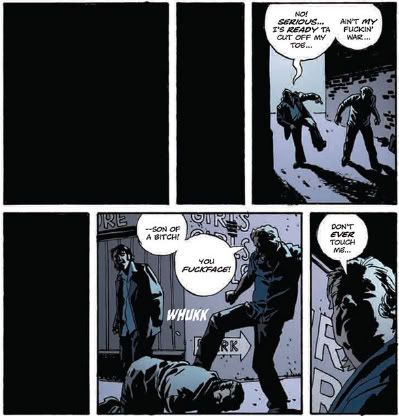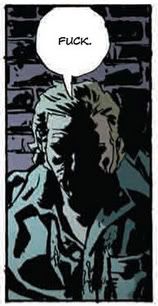Conformity 4/9: Jog obeyed every law in the course of obtaining this comic
/![]() Criminal Vol. 2 #2:
Criminal Vol. 2 #2:

Things are coming together pretty nicely. And if that sounds like I'm treating this issue as more of a chapter in a continuing serial than another standalone tale of crime, rest assured that I'm only putting it in the context of its strengths.
Sure, you can take this particular book as a one-off thing - there's a beginning, middle and end, and whatnot. The plot concerns Teeg Lawless, #1 Dad, and his thrilling adventures in the city after getting back from Vietnam in '72. He can barely look at his wife, the drink has sent his mind flickering, he's deep in debt to some bad characters, and the big score he's counting on is bound to turn out bad - he's the sort of guy this happens to. But the story isn't titled "A Wolf Among Wolves" for nothing, and Teeg just might be able to pull through with his special mix of disarming forthrightness and killing the hell out of lots of people.
It's fine that way. A haunted, dangerous man comes back to town, and proves to be more dangerous than haunted. Sean Phillips & (colorist) Val Staples make it look hard and ruined as filthy, well-trodden concrete, as usual. Ed Brubaker can (presumably) set down how Teeg's blackouts work in script form, but it's inspired visuals that combine, say, the passage of time via panel width with judicious use of black to convey Teeg's mental state. I like how panel #3 below continues the blackout for a bit into the alley where Our Hero and his pal are stumbling, only for them to hit another small wall of nothing.

The arrangements can even seem sort of musical, keeping beat between waking life and vivid memory, the latter marked with brighter, more indelibly violent color. Indelible for Teeg, I mean.

But that's not quite how I read this issue, and not why I think it's VERY GOOD; if Brubaker shows only one thing in Criminal, it's that isolation is a hopeless illusion.
Obviously, this issue overlaps with last issue; if you've been reading the backmatter, you know that the first three books in this second pamphlet-format 'volume' will center around the same crucial, bloody rip-off. And Brubaker gets some impact from the conceit - not only are certain plot points from issue #1 clarified, but series crime lord Sebastian Hyde is seen in selective enough a light that he seems to truly embody the image he desired to create for himself prior. There's connections between the the two issues, like similar images of each story's protagonist laying beaten on the ground at their change-of-path low point, as well as some amusing contrasts, like a character seen wielding a club in issue #1 getting thrashed with that same weapon in issue #2. Simple.
But the real impact comes from taking the whole Criminal enterprise as what it's acting like: a decades-spanning saga of ad hoc families, and fathers passing pain down onto their sons. You'll get what Teeg means when he says that he'll learn to hate his children from this issue alone, but I think it'll only register as effective when taken with the earlier Lawless storyline, starring the grown Tracy Lawless in the present day. Only then can you appreciate the irony of both series' similar endings, or the telling nature of subtler bits - watch how Teeg bides his time by knocking off gas stations with both his partner and the young Tracy. The partner doesn't come to a good end.
And neither does any son in this series. Tracy, Sebastian and Leo (from the Coward storyline) all eventually become their fathers in some awful way, even if they try to escape. It's been said that 'family' is the core theme of Brubaker's body of work, and it's maybe getting its richest airing here, albeit in a damned, noir manner. I find it striking that only Gnarly -- star of issue #1 and force behind the 'neutral' Undertow -- is able to escape this type of growth (thanks, grievous bodily injury!), and that Brubaker has paired him with a daughter in poor lil' Angie. Maybe she'll turn out better?
I don't know if we'll find out, but I expect further variations on this theme will cohere as we go further into the hard world of these bitter little tales, growing more concentrated in their sourness by the issue; I'm grateful. This book shares a war preoccupation with Marvel's other top crime series, The Punisher MAX, but Brubaker's noir fascination fittingly sees a broken and cruel society for soldiers to come home to. And what's more social than family?












